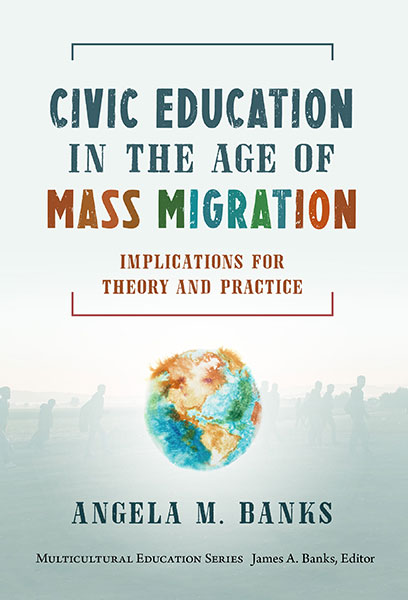Professors: Request an Exam Copy
Print copies available for US orders only. For orders outside the US, see our international distributors.
Publication Date: August 13, 2021
Pages: 160
Series: Multicultural Education Series

This important book offers an inclusive approach to preparing students to be responsible participants in a democratic society. Civic education generally operates through the lens of citizenship, where students learn what good citizenship is and what good citizens do. Yet the citizenship lens fails to identify the wide range of schoolchildren and their families who participate in economic, political, and social life. Civic Education in the Age of Mass Migration examines the exclusionary aspects of citizenship and offers democratic societies an alternative approach that includes all long-term residents regardless of citizenship and immigration status. Banks reimagines a civic education curriculum that gives secondary students the knowledge and skills needed to move the United States toward a more perfect union.
Book Features:
Angela M. Banks is the Charles J. Merriam Distinguished Professor of Law at the Sandra Day O’Connor College of Law, Arizona State University.
“Living up to its title, this text facilitates compelling consideration of civic education theory and what expanded conceptualization of citizenship means for practice.”
—Teachers College Record
“Banks effectively highlights the diverse struggles of historically marginalized groups in the United States in a way that threads these seemingly separate struggles.”
—Comparative Education Review
“The biggest contribution of this book is its consideration of the educational implications of a narrow focus on legal citizenship and the responsibility of educators to expand conceptions of rightful membership.”
—Harvard Educational Review
“Angela Banks has written a book that proposes powerful concepts and questions for the civic education curriculum.”
—Multicultural Perspectives
“In addition to providing an interdisciplinary rationale for an approach to civics education that is grounded in the necessary interrogation of exclusionary boundaries in taken-for-granted principles such as those commonly accepted about citizenship, Banks incisively demonstrates how these unquestioned democratic ideals also mask racism, classism, and other forms of prejudice and discrimination.”
—Journal of Ethnic and Cultural Studies
“In this powerful and groundbreaking book, Angela Banks draws on a wide range of legal, social science, and educational evidence to address the inadequate treatment of citizenship in civic education. She provides brilliant interdisciplinary analysis as well as concrete teaching examples to push civic education to consider citizenship as a site of exclusion, not assumed inclusion.”
—Hirokazu Yoshikawa, Courtney Sale Ross Professor of Globalization and Education and University Professor, New York University
“Angela Banks provides a persuasive, logical, and compassionate argument for expanding our notions and practice of citizenship education. Millions of young people are growing up under the shadow of liminal and mixed family documentation status—de facto, if not de jure, citizens. This extraordinarily important book provides a framework with which to expand citizenship inquiry rigorously and pragmatically within both our democratically aspirational societies and classrooms.”
—Carola Suárez-Orozco, Distinguished Professor, University of Massachusetts Boston; cofounder, Re-Imagining Migration
“This long-overdue book addresses key gaps in civic education, including the need for civics to question the boundaries of citizenship. With lucid prose, Banks has written an exceptional interdisciplinary book that provides key concepts and tools for realizing a more democratic society. An essential and compelling read.”
—Dafney Blanca Dabach, associate professor of education, University of Washington, Seattle
“In Civic Education in the Age of Mass Migration, Angela Banks critically considers the necessary civic education for fully integrating immigrants of different racial and other backgrounds into U.S. society. Besides identifying a neglected topic of study, the book powerfully demonstrates how the exclusionary aspects of immigration laws historically have shaped—and continue to shape—the integration of immigrants into the mainstream and, most importantly, offers concrete ways of facilitating a sense of belonging.”
—Kevin R. Johnson, dean, University of California, Davis School of Law
“Banks focuses not only on the fundamental question of what is it that we want our children to learn about ‘citizenship’ in its broadest sense of meaningful belonging in political communities, but also on the necessity of understanding how immigration and citizenship laws operate to restrict citizenship. While others have urged a more expansive view of citizenship, Banks has offered up an astonishingly creative array of tools and activities to bring that vision into our classrooms. Hers is a powerful and timely project.”
—Elizabeth Keyes, associate professor of law, Immigrant Rights Clinic, University of Baltimore
Contents
Series Foreword James A. Banks ix
Acknowledgments xv
Introduction xvii
1. Civic Education and Noncitizens 1
The Evolution of Civic Education 2
The Difference That Status Makes 6
Motivated Cognition 12
Teaching About Exclusion 16
2. The Boundaries of Citizenship 19
The Legal Regulation of Citizenship 21
Race, Class, and Gender as Citizenship Boundaries 22
The Continuing Legacy of the National Origin Quotas 26
Citizenship Boundaries and the Immigrant Labor Paradox 29
Implications for Civic Education 37
3. Redefining Membership Boundaries 39
Citizenship Dimensions 40
The Case for Membership 48
Implications for Civic Education 55
4. Civic Education in the Classroom 58
Conclusion 75
Appendix: Primary Resources for Classroom Activities 79
Repeal of the Chinese Exclusion Act Materials 79
Gender and Citizenship Acquisition Material 100
Essential Worker Materials 104
Notes 115
References 121
Index 131
About the Author 137
2022 NAME Philip C. Chinn Book Award
Professors: Request an Exam Copy
Print copies available for US orders only. For orders outside the US, see our international distributors.